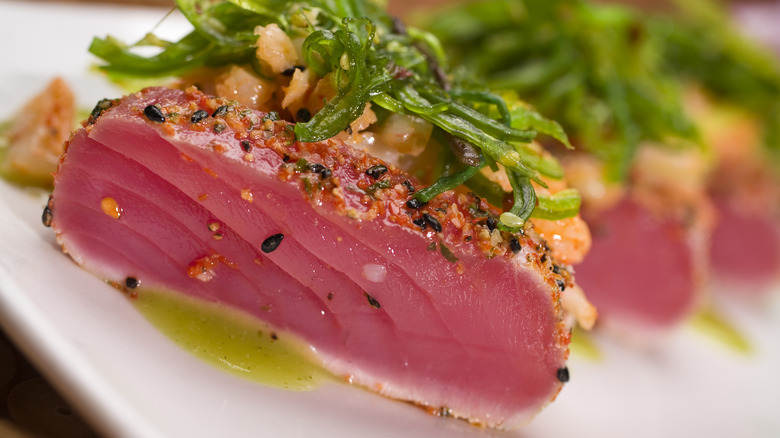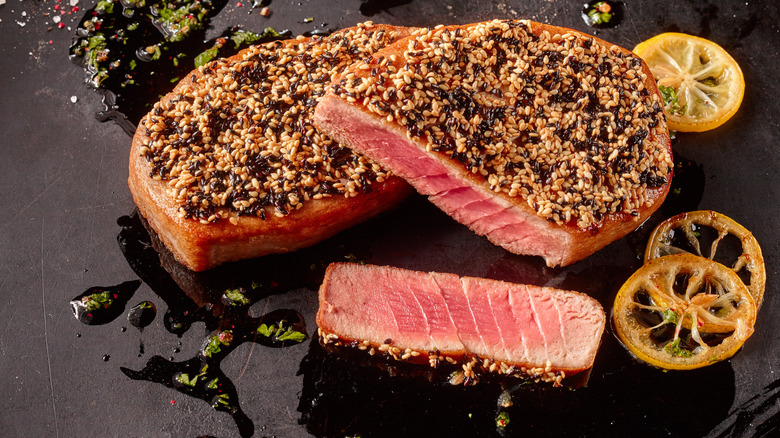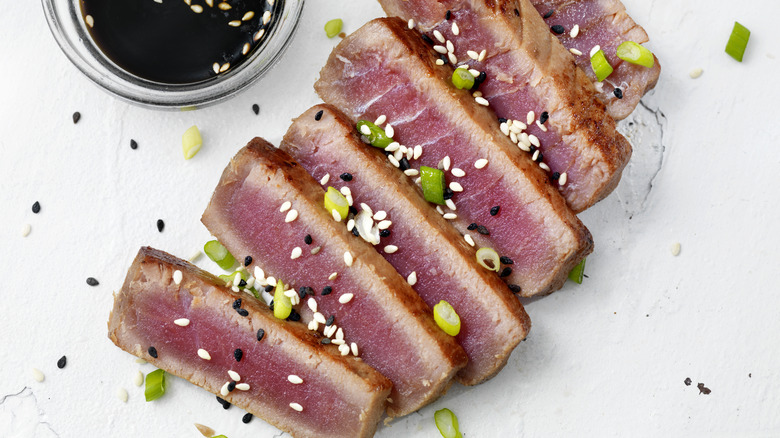How Long Should Tuna Steaks Marinate For?
Out of all the tuna in the sea, skipjack, albacore, yellowfin, bigeye, and bluefin are most likely to make it to the dinner table. This quick-cooking, tender fish has a meaty texture and, in many ways, is treated like meat during preparation. For example, tuna benefits from the tenderizing and flavor boost offered by a well-balanced marinade. However, unlike meat, which can spend up to 24 hours in a marinade, tuna should only be marinated for a maximum of two hours — particularly if the marinade is especially acidic.
Marinating is the act of submerging food in a mixture typically made of oils, seasonings, and acidic ingredients. There's a wide selection of ingredients to choose from within these categories, so you can play with different combinations to achieve the taste, texture, and moisture you prefer. Marinating is a common cooking practice around the world, and not just for meats. You can unleash super flavorful veggies with a marinade, and even enhance the flavor of vegan proteins like tofu and plant-based meats. As it relates to tuna, note that different rules apply to tuna steaks than to smaller cuts of tuna for sushi and raw dishes like tuna tartare and ceviche. When marinating tuna steaks, there are a number of things to keep in mind, whether you buy them pre-cut or slice them yourself.
Tuna marinade know-how
Marinating tuna serves several functions. The first is to infuse flavor into the muscle fibers of the meat. This is what brings the salty, savory, spicy, or even sweet bite to tuna. The second function is to tenderize the meat. Tuna is especially susceptible to drying out while it cooks, which is why it is typically served after a quick sear rather than cooking it through. Marination helps to reduce this drying effect.
Marinating also changes the texture of the fish. The process incorporates acids like vinegar, citrus, or wine, which break down the meat to relax it. Since tuna is a delicate fish, it doesn't take very long to soften the texture and add a punch of flavor. In fact, too much time in an acidic marinade will essentially "cook" the fish, much in the way ceviche is prepared. Since you want your tuna to remain raw, opt for a primarily oil-based marinade and stop the marinating process at the two-hour mark.
Tips for marinating tuna
Although you can marinate the tuna for two hours, you'll want to remove it from the fridge before that. For the best results, take it out of the fridge after one and half hours and allow your tuna steaks to sit out for up to a half hour before cooking. This allows the tuna to reach room temperature. During the quick cooking process, the inside of the tuna won't have time to warm, so allowing it to reach room temperature before cooking prevents a cold center. If you're short on time, marinate your tuna for at least 20 minutes before grilling, sauteing, or broiling. Since it's a shorter time, you can leave the tuna out of the fridge while it marinates. Be sure to flip tuna over about halfway through the marination so the flavors are uniformly dispersed throughout the fish.
The flavor profile for your marinade can take many forms. Popular combinations include ingredients like soy sauce, brown sugar, garlic, ginger, and green onions. However, if you're looking for a spicier finish you can add in paprika, chili powder, or even cayenne. Sticking with the ocean theme, coat your tuna steaks with a seafood seasoning blend instead. Since tuna absorbs salt quickly, use it sparingly and remember soy sauce often packs a salty punch.


